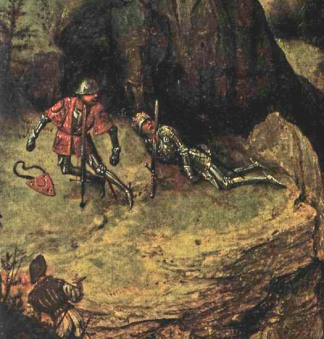We will briefly review several examples of mass murder committed by those who were allowed to govern all or part of the children of Israel. It should be noted that these bloody, heinous acts carried out by these kings (and one queen) were not approved of by God and did not fulfill his will.
Saul was the first of three kings to reign over a united Israel. Because of his disobedience, however, God anoints David as the future ruler of his people. Viewing him as a threat, Saul seeks a bloody solution to his problem. One day, he is told that David travelled to the priestly city of Nob and received assistance from Ahimelech the High Priest.
Angered that Ahimelech aided someone he believed a traitor, King Saul summons him and other Nob priests to meet him. When they arrive he accuses them of knowingly committing treason, even though he is told that they were unaware of his disagreements with his son-in-law (Samuel 22:12 - 15).

Saul, wanting the priests put to death, is unable to get any of his Israel born servants to do the task. He then commands Doeg, an Edomite, to carry out the bloody task of mass murder. Doeg kills all eighty-five priests in attendance. Not content with such mass carnage, he zealously travels to Nob and slaughters most of its innocent inhabitants, including women, babies and even animals (see 1Samuel 22).
The Gibeonites were a people living in Canaan long before the kings of Israel existed. They secured with Joshua an agreement that insured their survival and that they could continue living in the land in spite of it being part of what God gave his people (Joshua 9:3 - 15).
Years later Saul, for unknown reasons, slaughters many of the Gibeonites (2Samuel 21:1). God considers these bloody killings as a great sin and tells David he must rectify the situation in order to stop a three-year famine that was ravaging Israel (verses 2 - 9).
Prophesied Deaths
Baasha was the third ruler over the Kingdom of Israel after it broke away from the Kingdom of Judah in 930 B.C. He assumed the throne after murdering Nadab (the son of Jeroboam) in the Philistine city of Gibbethon (1Kings 15:27). Soon after coming into power, he murders anyone else who was of the royal family (verses 27 - 29), a bloody act which was prophesied to occur.
Ultimately, King Baasha was condemned for his many sins by the prophet Jehu, who foretold of the total destruction of his house just like the havoc he wrecked on Nadab's family.
And the word of the Lord came to Jehu the son of Hanani against Baasha, saying,
"Since I exalted you out of the dust, and made you ruler over My people Israel, and since you have walked in the way of Jeroboam, and have made My people Israel to sin to provoke Me to anger with their sins, behold, I will utterly sweep away Baasha and his house. And I will make your house like the house of Jeroboam the son of Nebat.
"Those of Baasha who die in the city shall the dogs eat. And those who die in the fields, the birds of the air shall eat." (1Kings 16:1 - 5).
The Bloody Queen
Athaliah was the daughter of wicked Ahab and Jezebel who had ruled Israel for twenty-two years. She married Jehoram who was in Judah's royal lineage. After her husband's death their son Ahaziah ruled for only one year. The queen, immediately after her son died, quickly moved to assure that she, alone, would rule over the Kingdom.
Athaliah initiates a mass murder against all of King David's male descendants, killing all those of royal blood except one (Joash). Her bloody six-year rule ends when she is slain by the palace guard (2Kings 11:3 - 16).
And Athaliah was the mother of Ahaziah. Now when she saw that her son was dead, she arose and destroyed all the seed of the kingdom.
But Jehosheba the daughter of king Jehoram, sister of Ahaziah, took away Joash the son of Ahaziah and stole him from among the king’s sons before they were killed. And they hid him from Athaliah in the bedroom, him and his nurse, so that he was not killed (2Kings 11:1 - 2, see also 2Chronicles 22:10 - 11).
The Most Brutal
Menahem was one of the most brutal and bloody kings of Israel. Soon after taking over the reins of power, through his murder of Shallum, he sought to enter into the border town of Tiphsah.
Angered that he is refused entry into the city, Menahem lays siege to it and kills anyone he finds. His murderous spree is uniquely brutal and unprecedented, even among other unrighteous rulers of Israel, as his anger at being snubbed drives him to violently rip open pregnant women.
Then Menahem struck Tiphsah, and all in it, and its borders, from Tirzah. Because they did not open their gates to him, he struck it. He ripped up all its pregnant women (2Kings 15:16).
King Manasseh reigned over the Kingdom of Judah for 55 years, the longest of any king who ruled solely the Jews or northern Israel. During his rule he slaughtered so many innocent people that the Bible states the following.
Furthermore, Manasseh also shed very much innocent blood until he had filled Jerusalem from one end to another; besides his sin with which he made Judah to sin in doing the evil in the sight of the Lord (2Kings 21:16).
Another Judean king, Jehoiakim, who ruled more than thirty years later, would also fill Jerusalem with his bloody murders (2Kings 24:4).